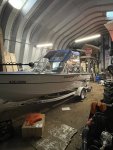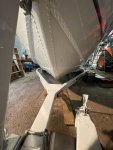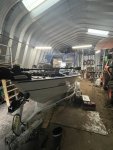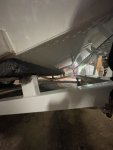yup your description of planned usage screams pontoon. Or as I call them party barge.
I was born on a boat and lived my entire childhood on a boat from age birth to age 11, when dad sold the last one and we moved permanently to land. I liked it at first but missed the water. Right about 2 years later we had to move, had our choices where to move TO, but we moved SOUTH. Thank goodness. Hated it at first but realized as I grew older that what we have here trumps what they had up there. There is a body of water within 2 miles in any direction of my place, and while I don't use all of them, the 3 that I do use are no more than 30 min-at the most. 2 of them are world-reknown, actually they're both one in the same but in 1969 a dam was finished and created an awesome reservoir behind, and a tailwater that had perfect conditions for a totally different species-TROUT. Trout can't live here without cold water and cold water does not naturally exist here save for one or two deep caves that have springs coming out of them. They're small.
Anyway Dad had a repair business. Him and I did a LOT of I/O repair. The allure of I/O is that the engine itself is buried down in the hull which makes the boat run quieter across the water than the old 2 stroke outboards. Well, now that 4 stroke outboards have really taken off, that advantage of the I/O over the outboard is gone. The outboards with 4 stroke engines are often quieter and considerably lighter and more fuel efficient than I/O. Most I/O are automotive-style engines or derivatives of them, the same basic engines that came in cars. The only downside to that is that they are specifically designed for usage in cars and trucks, that have little load on them at all times, and run low(er) engine speeds. In a boat, they can and often do run full throttle for hours on end without ever letting it rest, and at 4500-5000 RPM to boot. So they wear out faster. Secondly because of the way they're designed and where they're often placed way down in the hull, they are much harder to work on especially when it comes to winterizing. You have to get ALL the water out of the engine and that means taking the plugs out of the block, then reinstalling them and adding a special antifreeze/corrosion inhibitor. if you don't get the water out, it'll freeze and break the block every time. Then you get to pay someone to pull the engine out and replace it-not cheap. There are two types of I/O cooling systems, raw water and closed. Raw water systems pull water out of the lake/river and circulate it through the engine to cool it, and return it back to the lake. Closed systems are like cars where they have a radiator, but the radiator is encased and has lake water circulated around it (heat exchanger). Closed systems are a little better in keeping the engine from getting corroded and as long as it's got antifrieeze in it, it won't usually bust--but you have more complexity. Raw water systems are less complex less expensive but also more susceptible to freezing conditions and corrosion. With an outboard, you tilt it down once out of the water and it drains itself. Winterizing is much simpler and therefore much cheaper. And being 4 stroke, they are often really quiet running-the bigger inline 4 cylinder engines (usually 150hp+) and V6 engines are silent at idle and low speeds.
safety is a big thing here and if you have little to no experience you will be wise to run around on the water with someone who does. Case in point, the bigger lake about a half hour from here that I am on when the weather allows, the lake is currently about 7 feet below normal. At that level, even that deep lake has a lot (thousands) of trees that are barely submerged below the surface. A little chop on the water, and you cannot see them. They disappear. All it takes is one to throw you or someone else out of the boat and yes I found a few last weekend. Luckily at low speed (idle) so no harm done. It's very very easy to get complacent. The water is no place for complacency. It is to be respected, and it will kill you. But it can also be very rewarding in that it is a relaxing place to be, at least for me. I have been through both. When I was 8 I was in a raft floating around behind dad's boat at the marina while he was doing some maintenance on the boat. It was running at idle. Next thing I know I wake up with doctors around me. I don't remember a lot of it but mom always tells me that the doctors said I could not be revived and that they should plan on arrangements. Carbon monoxide poisoning. That's a rare deal but it goes to show you that the water, is unforgiving. You have to KNOW the weather, the conditions, know how to use your sense of direction, err on the cautious side and be mindful of your surroundings. If the birds are all sitting around doing normal bird stuff and you see them all take flight at once, something's up. Is there a storm brewing? You gotta pay attention to 'things' like that. The weather alone can and often does change in minutes, and in my lil boat and where I am at on the lake, I'm a good 20-25 minutes run from the ramp, and often in that part of the lake in my little boat, there is no sight of land in any direction. I have a spot picked out where I demolish the crappie population, but it's way on out there. And even when I'm in differnet areas where I can see land, I still keep the GPS handy--I always 100% of the time record my route TO where I'm going and then if it's needed going back, I can use it as needed. There's been times I've been out there, perfectly clear conditions and when I head back, run into a fog bank so thick that londoners would be jealous. Cant even see the front of the boat sometimes--hence why GPS is a nice thing to have. Always have a plan B and C. Doing so, you will enjoy your time on the water safely. And to me, there is nothing quite like being on the water. You'd think I'd be used to it by now but every time I go, it always a great experience.
I highly recommend taking some sort of class. I have a six pack license and that's probably not necessary for you, and was not really for me either but was worth every penny in learning the things that a boater ought to know. And it's also a "plan B" should the financial need arise to do something else.
Just a quick pic I took before the leaves started turning, back in October, just to wet the whistle.











